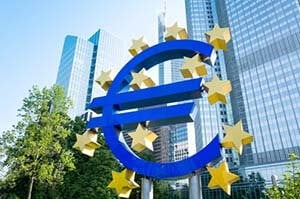Sept. 16 update: The Eurozone inflation rate is slipping despite the best efforts of the European Central Bank to increase it. Eurozone inflation declined to 0.1% from 0.2% in August, according to the European Union's statistical office. Previous estimates had said the inflation rate would remain flat.
Original story follows:
The European Central Bank (ECB) is loath to admit it, but it has no control over the Eurozone inflation rate.
According to the Eurostat flash estimate released this morning (Monday), Eurozone inflation in August was unchanged at 0.2%.
That's far below the 2% inflation rate target sought by the ECB. And it shows just how ineffective the central bank's unprecedented monetary stimulus program has been.
 The ECB is in the middle of a €1.1 trillion ($1.2 trillion) quantitative easing program, similar to the three rounds of QE programs implemented by the U.S. Federal Reserve from 2008 to 2014.
The ECB is in the middle of a €1.1 trillion ($1.2 trillion) quantitative easing program, similar to the three rounds of QE programs implemented by the U.S. Federal Reserve from 2008 to 2014.
The ECB has been buying €60 billion worth of bonds each month since March in a desperate attempt to drive Eurozone inflation higher. The QE program is expected to last at least until September 2016.
There's little evidence that QE has worked anywhere it has been tried, other than to artificially boost stock prices and inflate asset bubbles.
In the case of the ECB, not only has it failed to raise the Eurozone inflation rate, its forecasts have been consistently wrong.
Despite evidence to the contrary, ECB Vice President Vitor Constancio expressed optimism that the central bank will get the Eurozone inflation rate to rise to the desired targets in a paper delivered at the Fed's Jackson Hole retreat this past weekend.
"Provided our policies are able to significantly reduce the output gap, we can rely on a material effect to help bring the inflation rate closer to target," Constancio said.
But outside experts disagree. In fact, when the ECB does finally admit that its QE program is not succeeding in raising Eurozone inflation enough, the odds are it will do even more bond-buying.
The ECB Will Stop at Nothing to Raise Eurozone Inflation
"The ECB forecasts must show lower inflation. I don't see how it can be any different," Carsten Brzeski, an economist with ING, told Reuters. "The ECB will prepare markets that it is willing to step up its efforts."
Just last week, ECB Chief Economist Peter Praet dropped the first hint of more QE when he said there's "no ambiguity on the willingness and ability... to act if needed."
Just what a struggling Eurozone economy needs right now - a doubling down on failing policies.
Instead, the ECB should consider taking the advice of Bank of England Governor Mark Carney:
"We have to be clear about when we fail," Carney said at a Jackson Hole discussion session. "It is a painful process, but it can bring some credibility."
What's Up with the Federal Reserve? Central bank policy in the United States is no more settled, as the markets struggle to discern exactly when the Fed will raise interest rates. Over the past week, different Fed governors have dropped contradictory hints about what it will do at its September meeting. Here's what that has done to the markets...
Follow me on Twitter @DavidGZeiler.
Related Articles:
- Reuters: Low Inflation in Europe Puts Spotlight on ECB
- Bloomberg: Jackson Hole Questions Inflation Mastery Sought by Draghi & Co
About the Author
David Zeiler, Associate Editor for Money Morning at Money Map Press, has been a journalist for more than 35 years, including 18 spent at The Baltimore Sun. He has worked as a writer, editor, and page designer at different times in his career. He's interviewed a number of well-known personalities - ranging from punk rock icon Joey Ramone to Apple Inc. co-founder Steve Wozniak.
Over the course of his journalistic career, Dave has covered many diverse subjects. Since arriving at Money Morning in 2011, he has focused primarily on technology. He's an expert on both Apple and cryptocurrencies. He started writing about Apple for The Sun in the mid-1990s, and had an Apple blog on The Sun's web site from 2007-2009. Dave's been writing about Bitcoin since 2011 - long before most people had even heard of it. He even mined it for a short time.
Dave has a BA in English and Mass Communications from Loyola University Maryland.



